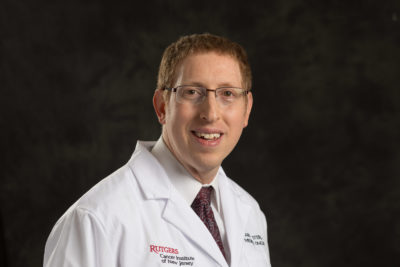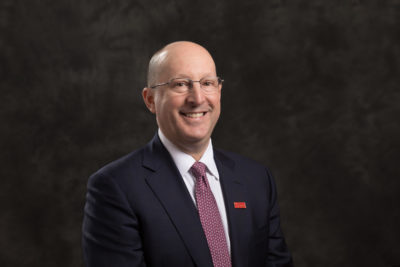March 1, 2017:
Investigator Spotlight
Mark Stein, MD
Educational Background: BS, Yale; MD, New York Medical College; Internal Medicine, Albert Einstein; Fellowship in Oncology Hematology, Mount Sinai School of Medicine

Rutgers Cancer Institute of New Jersey. 1/13/17 Photo by John O’Boyle
Research Interests: I am interested in developing novel therapies for the treatment of genitourinary malignancies. The potential benefit of immunotherapy for the treatment of prostate cancer is still poorly understood. Through collaboration’s with my colleagues at Rutgers, pharmaceutical companies (some of which are even located in New Jersey) and other members of the Big Ten, it is my hope that we will be able to utilize immunotherapy earlier in the course of treatment of prostate cancer and potentially the effects from treatments that decrease testosterone levels and cause significant side effects. Kidney and bladder cancer have likewise seen tremendous progress through use of immune checkpoint inhibitors. However, the majority of patients still did not benefit from these therapies. The GU group in the Big Ten has developed very innovative trials to potentially extend the benefits of immunotherapy to additional patients.
Fun Facts: I have been trying to perfect my freestyle swim stroke for the last three years. I think I finally figured it out last week.
A vacation doesn’t count unless it involves getting into a boat – preferably a kayak moving quickly.
My dream is to cure cancer and use my scientific knowledge to make very good wine.
Thought Leader Perspectives
Steven K. Libutti, MD, FACS, director, Rutgers Cancer Institute of New Jersey, Rutgers University; senior vice president of oncology services for RWJBarnabas Health

Rutgers Cancer Institute of New Jersey. 1/13/17 Photo by John O’Boyle
Despite the progress made in the last 50 – and even last 10 – years, there is still much work to do in learning about the biology of cancer and translating that knowledge to novel therapeutics for our patients. While scientific collaborations with academia, cooperative groups and entities such as Big Ten CRC are critical for cancer centers, just as important are clinical collaborations and the collaborations practitioners forge with their patients.
The biology of cancer is such that, in many cases, the tumor has been present for much longer than the patient has known it to be there. In these cases, immediate care is not measured in days or weeks, thus the biology of cancer allows for more time to plan a course of treatment. Unfortunately, that doesn’t take into effect the psychology of cancer. With that, we’re seeing a shift in care delivery at many healthcare entities across the nation, including Rutgers Cancer Institute, addressing that aspect. New timelines of care in which patients are receiving both rapid first-time consults and treatment start dates are being seen, as is an emphasis on palliative care and the deployment of nurse navigators. A rapid, guided approach to care delivery, resulting in a patient being seen by multiple specialists during the same visit and leaving with a treatment plan is very empowering. It immediately addresses the psychology of the diagnosis helping the patient to perhaps be more accepting of the appropriate timeline in which to effectively treat the cancer. If you can do that well, I think patients have a better experience and outcome. It’s not just cancer treatment, but cancer care.
This delivery of care is best seen under a collaborative umbrella. In recent years, there has been a proactive stance of identifying risk for various diseases including cancer, and this identification results in the need for comprehensive healthcare networks that are more accessible to patients. This approach involves cancer centers and hospital systems working together. For example, this concept is allowing Rutgers Cancer Institute of New Jersey and the RWJBarnabas Health system to reach more patients across our densely populated state, enabling access to interdisciplinary care with various specialists available during one appointment. This method of integrated care delivery also enables patients to have access to novel treatments and clinical trials that they may not have had access to otherwise. Not only does this approach ensure an exceptional level of care, but also that our research – including clinical trials conducted with our Big Ten CRC collaborators – touches everywhere we practice. Integrated care delivery is the new norm, and it is here to stay.
About the Big Ten Cancer Research Consortium: The Big Ten Cancer Research Consortium was created in 2013 to transform the conduct of cancer research through collaborative, hypothesis-driven, highly translational oncology trials that leverage the scientific and clinical expertise of Big Ten universities. The goal of the Big Ten Cancer Research Consortium is to create a unique team-research culture to drive science rapidly from ideas to new approaches to cancer treatment. Within this innovative environment, today’s research leaders collaborate with and mentor the research leaders of tomorrow with the unified goal of improving the lives of all patients with cancer.
About the Big Ten Conference: The Big Ten Conference is an association of world-class universities whose member institutions share a common mission of research, graduate, professional and undergraduate teaching and public service. Founded in 1896, the Big Ten has sustained a comprehensive set of shared practices and policies that enforce the priority of academics in the lives of students competing in intercollegiate athletics and emphasize the values of integrity, fairness and competitiveness. The broad-based programs of the 14 Big Ten institutions will provide over $200 million in direct financial support to almost 9,500 students for more than 11,000 participation opportunities on 350 teams in 42 different sports. The Big Ten sponsors 28 official conference sports, 14 for men and 14 for women, including the addition of men’s ice hockey and men’s and women’s lacrosse since 2013. For more information, visit www.bigten.org.














Subscribe to the Big Ten CRC Newsletter X
X Facebook
Facebook YouTube
YouTube